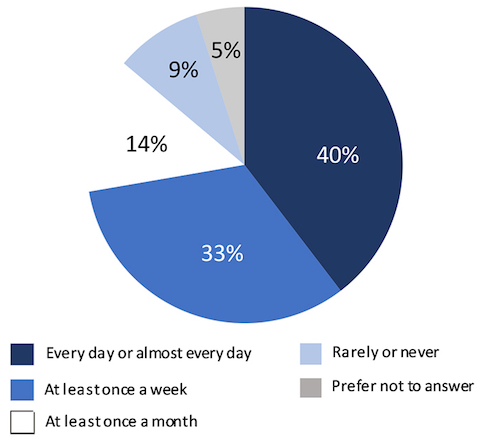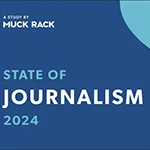The American public has grown increasingly concerned about disinformation and the role it plays in political polarization as well as the threats it poses to our elections and democracy, according to a report from the Institute for Public Relations.
The IPR report, which asked Americans about their perceptions of disinformation’s impact on society, found that nearly two-thirds (61 percent) of respondents now consider misinformation and disinformation as a major issue and a more pressing threat than other noteworthy concerns such as border security (57 percent), the budget deficit (56 percent), climate change (55 percent), domestic terrorism (44 percent) and international terrorism (43 percent).
 |
| 40 percent of Americans said they come across news information that they believe misrepresents reality at least every day or almost every day. |
Four in 10 respondents (40 percent) said they see disinformation almost every day, while a third (33 percent) said they encounter it at least once a week.
Americans still don’t consider disinformation our single biggest threat—at least not yet. The issues currently considered to be the top problems facing Americans today are inflation (73 percent), healthcare costs (72 percent), crime (71 percent) and gun violence (68 percent).
Three-quarters (75 percent) of Americans believe that disinformation undermines our election process, and a similar number (74 percent) consider it a threat to our democracy. Others think disinformation will increase the polarization of political parties (73 percent) and that it also infringes on human rights (61 percent).
Americans also think the spread of artificial intelligence will only further accelerate disinformation’s deleterious effect on society: More than half (55 percent) of respondents believe that AI platforms will be responsible for disseminating even more disinformation in the future.
Most Americans believe that social media platforms are to blame for the majority of the disinformation that the public sees today. The top three social media platforms seen as being at least “somewhat” responsible for spreading disinformation are Facebook (73 percent), TikTok (65 percent) and X (formerly Twitter) (62 percent). Other offenders deemed at least “somewhat” responsible for spreading disinformation include politicians from the respondent’s opposing party (68 percent), political activist groups (67 percent) and foreign governments such as the Chinese government (66 percent) and the Russian government (66 percent).
When it comes to who bears the responsibility in combating disinformation, most Americans primarily view it as a role for the U.S. government (62 percent) or President Biden (60 percent). Various federal agencies, cable news companies, newspapers, Congress and journalists followed (all at 58 percent).
As usual, while Americans appear leery about others’ ability to discern truth from fiction, they seem particularly confident in at least one party’s ability to weed out and combat disinformation: themselves. When asked what source combats disinformation in the media at least “somewhat well,” 65 percent said “me,” followed by an additional 60 percent who said “people like me.” Local broadcast news, fact-checking websites and local newspapers followed (at 48 percent, 48 percent and 46 percent, respectively).
While two-thirds of Americans think the federal government should be responsible for combatting disinformation, only 35 percent said they think the government is doing a good job at it.
IPR’s annual “Disinformation in Society Report” was based on a survey of more than 2,000 Americans between July and August. Research was conducted by polling and marketing research firm Leger.
IPR is the nonprofit PR research organization based at the University of Florida.


 Consumers who once demanded convenience now require consistent, multi-channel experiences that cater to them at every point. Brands must have a clear, audience-appropriate, and channel-specific voice across all platforms.
Consumers who once demanded convenience now require consistent, multi-channel experiences that cater to them at every point. Brands must have a clear, audience-appropriate, and channel-specific voice across all platforms. Employees at U.S. companies are experiencing high levels of burnout, but managers are lagging behind when it comes to their awareness of the problem
Employees at U.S. companies are experiencing high levels of burnout, but managers are lagging behind when it comes to their awareness of the problem Brand has a powerful effect on a company’s valuation, but the level of brand understanding in the investment community leaves a lot to be desired, according to a new study from Brodeur Partners, Interbrand and NewtonX.
Brand has a powerful effect on a company’s valuation, but the level of brand understanding in the investment community leaves a lot to be desired, according to a new study from Brodeur Partners, Interbrand and NewtonX. AI may still be viewed with a wary eye by most media pros, but its use is growing, according to a new study from Muck Rack.
AI may still be viewed with a wary eye by most media pros, but its use is growing, according to a new study from Muck Rack. A new study from Walker Sands says that some marketers have been putting the cart before the horse when it comes to the relationship between marketing channels and business outcomes.
A new study from Walker Sands says that some marketers have been putting the cart before the horse when it comes to the relationship between marketing channels and business outcomes.


 Have a comment? Send it to
Have a comment? Send it to 
Nov. 27, 2023, by Joe Honick
Not necessarily for posting, but...there's the absent "therefore" again! Therefore, how do we teach information communicators to spot disinformation and alert clients or themselves...Therefore, what does that mean economically and how canit be attacked? Remember the first victim of war and competition is of course : truth. Therefore, how do we combat the skill of disinformation? In other words, when we spot something, the most natural word and thought must be the "therefore" to define and fix.